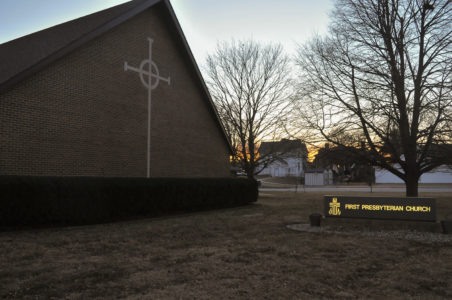
A public event titled “Race: The Power of Illusion,” was held at Grinnell’s First Presbyterian Church last Monday, Jan. 29. The Iowa Department of Human Services (DHS) facilitated the program, presenting on the systemic racial biases present in our legal system and culture.
The workshop included sessions lasting from 8:45 a.m. to 3:45 p.m. and attracted clergy, police officers, members of the school system and primary health care counselors. There were also members of the public that brought the total number of people in attendance to 35.
David Cranston, a retired physician and member of First Presbyterian church, helped organize the event. He decided to ask First Presbyterian Church to host the event after he and his wife Linda attended a similar event presented by DHS in Cedar Rapids.
“We didn’t think we were racist, but yet we found that sometimes the way some of our perceptions and the way we approach people of other cultures or other races is off-putting to them, and there was hidden racism in our belief system,” Cranston said of this first experience. “That’s what I hope other people get from this.”
The overall purpose of the DHS event was “to promote equity for minorities. Largely racial, but not entirely,” Cranston said. “Equal is not necessarily equitable.”
This notion was portrayed in a demonstration on assistance programs, showing how some people naturally have the ability to overcome a barrier and therefore do not need additional support, while other people are disadvantaged and require additional resources to help them overcome the barrier. The moral of the story was that in such cases, an unequal redistribution of resources may be equitable.
“If we got rid of the barriers for everybody then there would be less of a problem,” Cranston said. “It sounds great in theory, but it’s hard to do in our society, because everybody seems to want their own and [doesn’t] want anybody else to get any part of the pie if it’s going to cost them something.”
In light of recent incidents highlighting racial inequality, Cranston explained that the purpose of the event was to “educate the public so they have some facts to understand that a lot of the prejudices are not really based on fact.” He explained that often, prejudice is “incorporated into the way the legal system is set up, [and] some of the financial systems have been set up to cause discrimination and disadvantage minority groups.”
The event included discussion of specific historical policy biases such as Federal Housing Administration (FHA) policies which prevented Black homeowners from building equity in homes because their only option was to rent.
“[When] qualified servicemen [came] back from World War II, the white ones got qualified for FHA loans and the Black ones didn’t, or if they did, they couldn’t get housing because of the discrimination in the housing developments,” Cranston said.
The event connected these concrete examples with broader patterns. However, Cranston sees the event only as a starting point, from which “people [can] start talking about racial issues or minority issues … to understand that we are all basically the same people. … We all want the opportunity to improve our lot in life.”
According to Cranston, there is interest in a follow-up meeting in a few weeks. He also noted that the advertising didn’t reach Grinnell College students because of winter break, but he said this type of event is something the College might be able to host in the future.























































